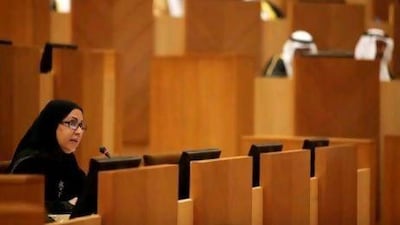ABU DHABI // Unemployment benefit will not be paid to jobless Emiratis who are fit to work, the Minister of Social Affairs told the FNC yesterday.
Mariam Al Roumi said she did not want people to fall into dependency. "Whoever deserves it gets help," she said. "An addict who has worked on keeping to their rehabilitation programme should, as it would be hard for them to get a job, but a person who had work and quit it should not."
Rejecting the council's call to extend unemployment benefit, Ms Al Roumi said her ministry's role was to provide "social help", not "social security". By law, she said, unemployment benefit should go only to those unable to work.
The minister accepted calls for benefits to be raised to keep pace with inflation, and for new categories of recipients such as single and young divorced women.
"The law needs to be amended and we intend to amend it," she said. "Currently we are studying it and comparing it to worldwide practices, and GCC laws."
A direct link to inflation was important but difficult, she said, because there was no poverty line or indication where it should be.
"Most countries around the world have a poverty line, and depending on it can decide on the help. Here we do not have a poverty line, and we are trying to study as much as we can prices in the market - but probably this will not give us the right picture."
Several FNC members highlighted individual cases of hardship. They included people entitled to benefits who had received nothing for five years.
The minister said these cases had their support frozen only briefly. In one case, she said, someone with a previously "high" salary had gone overseas to study for a further degree. Undergraduates were a higher priority, she said.
She gave figures showing that 82 per cent of the 88,000 benefit recipients were content with the current system.
Members also highlighted the case of Emiratis who lived abroad, returning only to pick up their benefits. "There are people outside the country getting these benefits, they come into the country every six months just to update their data," said Sultan Al Shamsi (Ajman).
The minister said she was not aware of any such cases, and they should be reported and would be stopped.
She was also unaware, she said, of cases of elderly divorcees and widows - including one FNC member's mother - being forced to provide documents every six months to prove they had not remarried, in order to collect their benefits.
"It is not a nice sight having an elderly woman, being supported by two men, her witnesses, up the stairs as she goes to get documents to state she has not remarried," Dr Mona Al Bahar (Dubai) said.
The minister said such proof was not needed under a previous presidential order. "If there are such cases, let me know to end it as soon as possible," she said.
The minister said the UAE was one of very few countries that made so many people eligible for help, and 92 per cent of the ministry's Dh2.5bn budget was paid out as benefits.
A large chunk of that goes to Emirati women married to foreigners, whose husbands were then ineligible for work. The minister said when this group were included in benefits legislation, a "tremendous" number of women applied.
She said this needed to be reviewed, and the husbands should be allowed to work. "This also opens the door to other societal problems and it could lead to a trend," she said.
Members repeatedly called on the ministry to do more to find employment for those on benefits.
The minister insisted that was other entities' responsibility, and noted that some did not want to work. Even so, her ministry worked on providing training and job placements.

